*iSelect’s partnered with CIMET to help you compare a range of internet plans and providers. Not all plans or providers in the market are compared and not all plans or special offers are available at all times, through all channels or in all areas. Not all plans available from CIMET’s providers are compared and due to commercial arrangements, area or availability, not all plans compared will be available to all customers. Learn more
Compare a range of Internet providers*
What is an NBN Plan?
An NBN Plan is your all-access pass to the Internet, connecting you via the NBN (National Broadband Network) to the digital world.
How do NBN Plans work?
Internet Providers offer a range of NBN Plans with options to suit all types, from the folks who only check their email once a week right through to the permanently online. When you’ve chosen a provider and plan, you can quickly get set up and start surfing the web.
Helpful Tip:
Before you sign! Make sure to read the fine print. Some contracts can lock you in for a fixed term and charge you an early cancellation fee if you end the plan before then.
If you’re planning to move in the future, it’s also worth asking your internet provider if this will affect your plan. Depending on your provider (and where you’re moving), it might be a simple process. But it’s a smart move to find out upfront if you are going to incur any extra fees.
What should I look for when comparing NBN Plans?
Which NBN Plan should I choose?
Knowing your Internet needs could help you more easily compare NBN Plans. Your household might need a basic option or something a little more souped up. Click on each image to take a closer look!
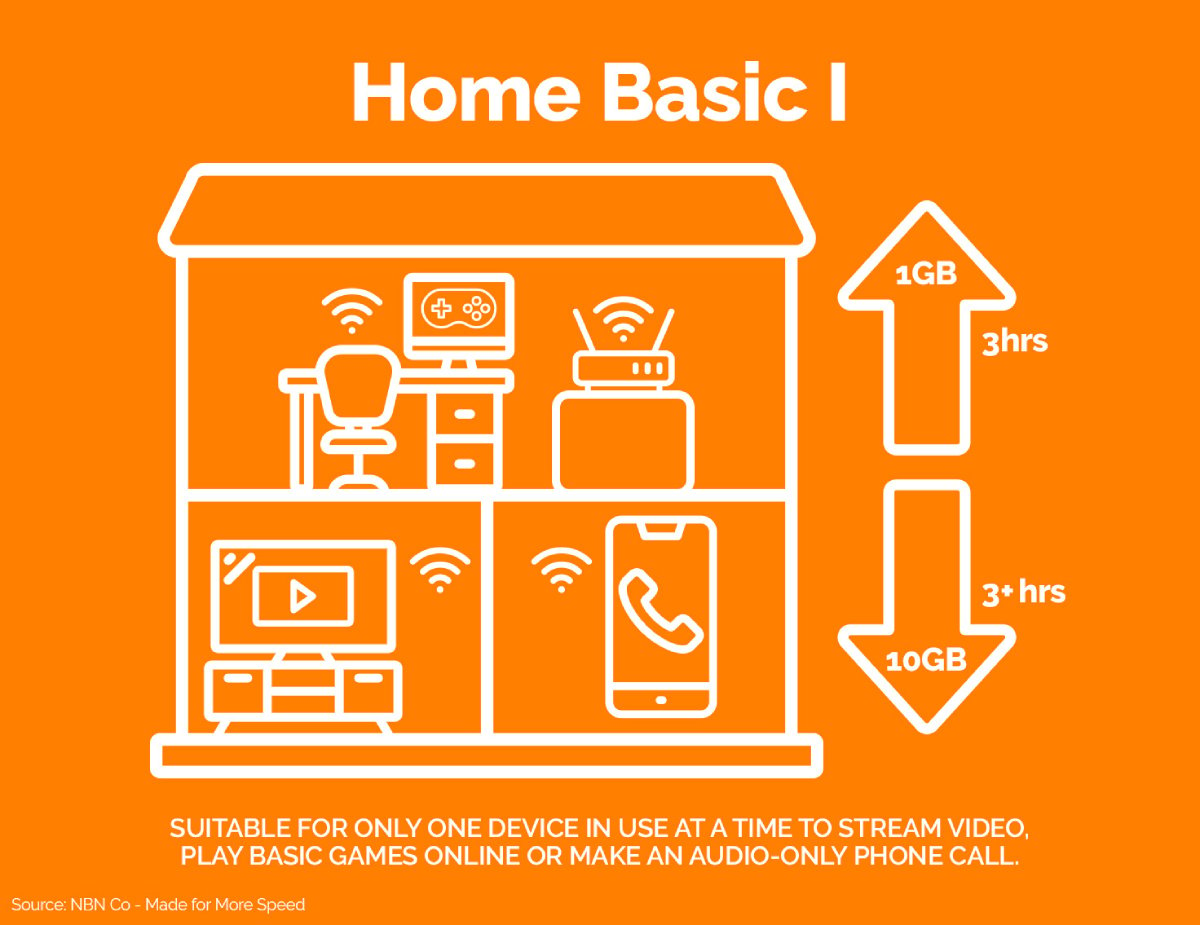
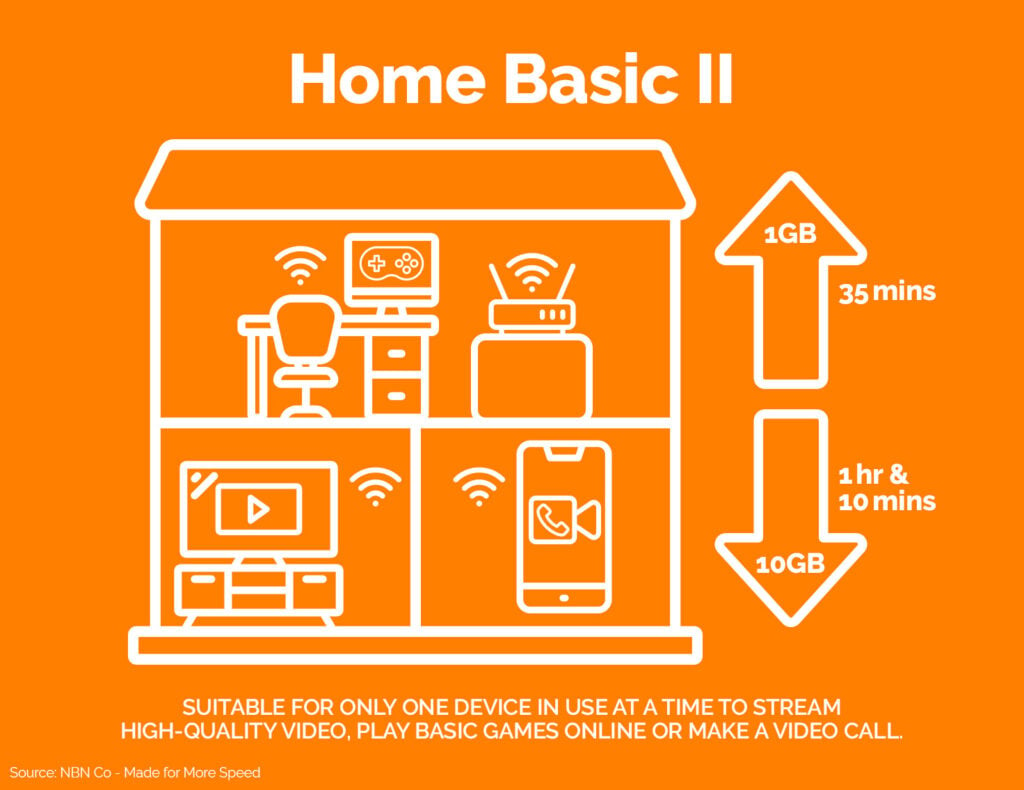
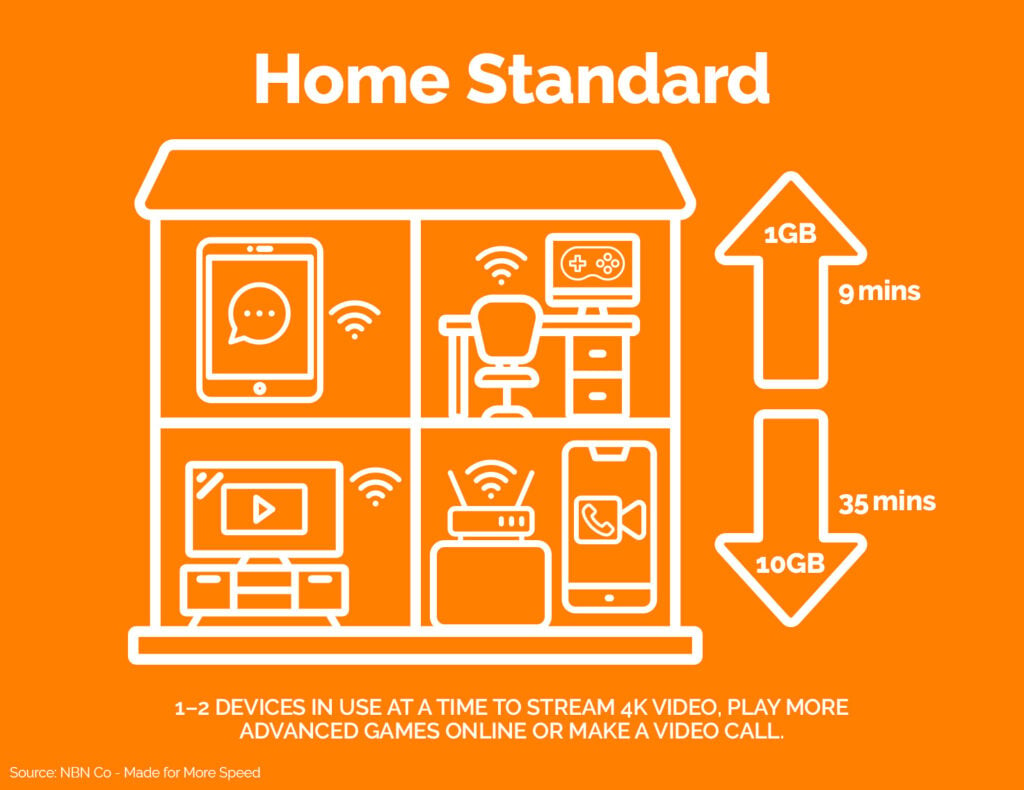
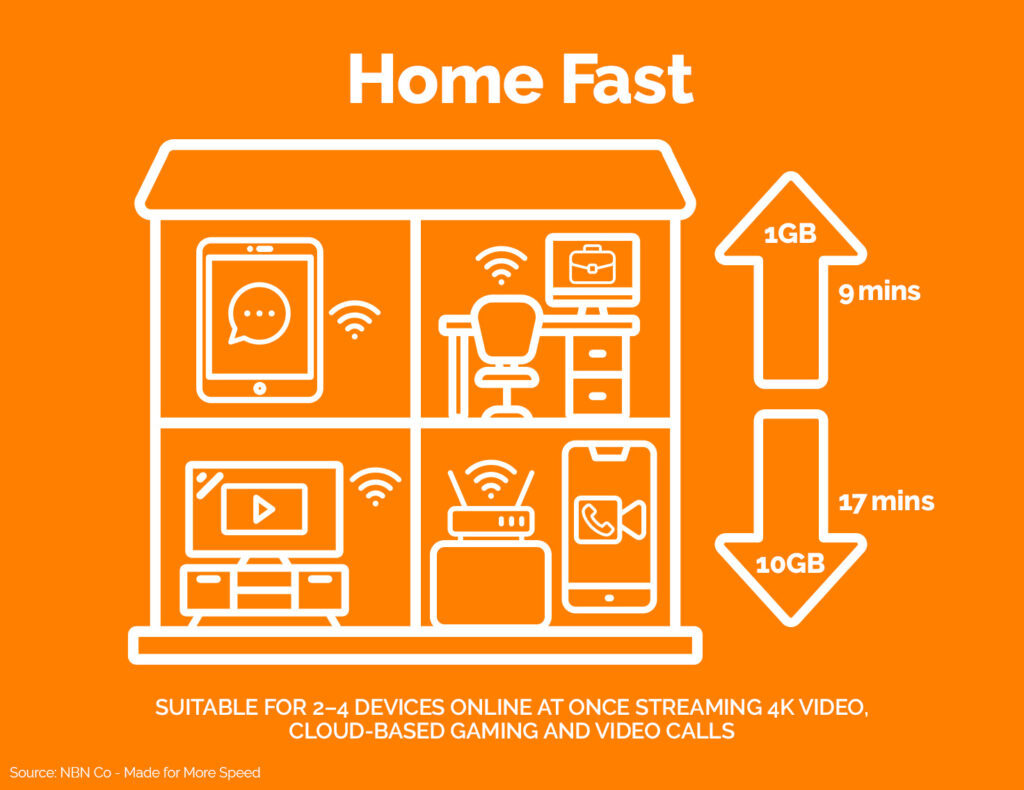
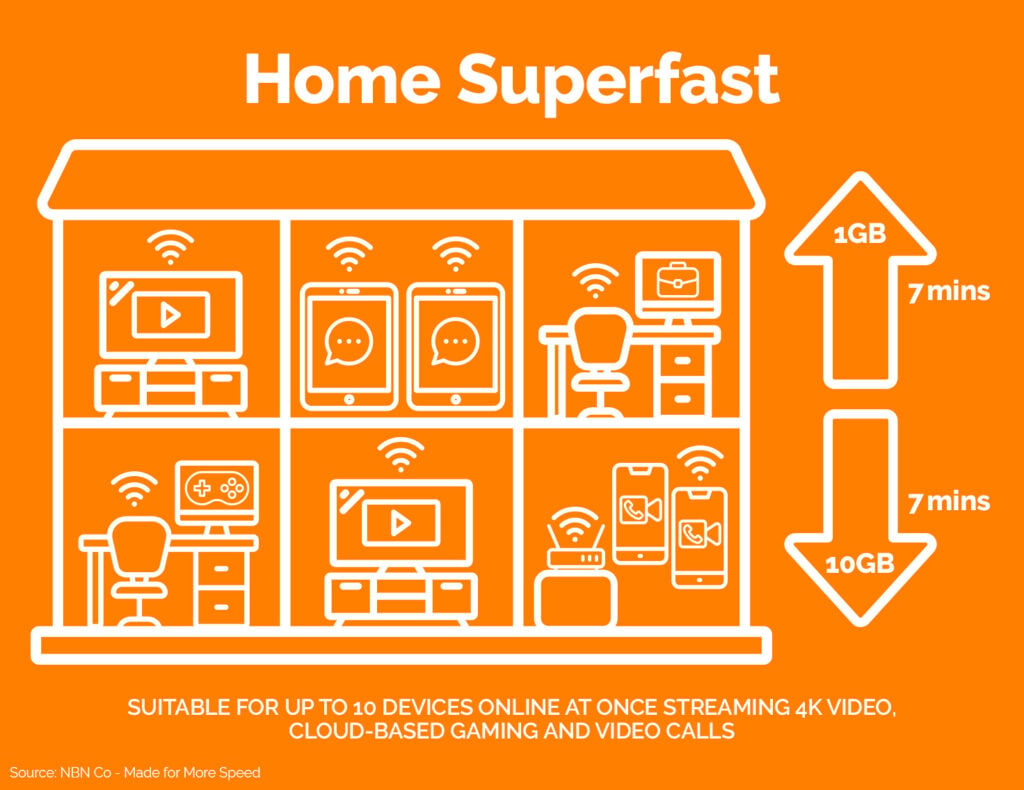
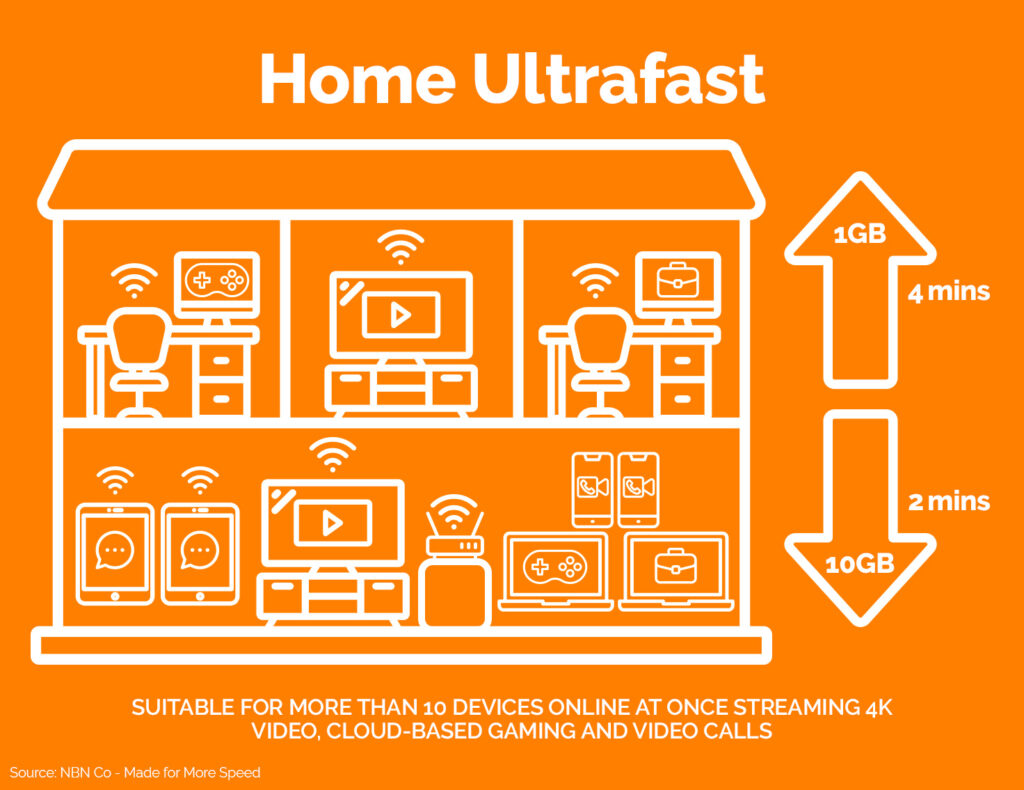
Frequently Asked Questions
How do I connect to the NBN?
There’s seven different ways to connect to the NBN but, for the most part, all you need to do is plug your modem or router into the right port in the wall.
Many properties in Australia, including apartments, will have some form of fixed line connection with a physical line going from your place to a node or distribution point unit. For fixed line connections, you might need to have an NBN connection box installed in your home or you might be able to use your existing plug-in point.
If you’ve got a fixed line, you might see your NBN connection referred to as:
- Fibre to the Premises (FTTP)
- Fibre to the Node (FTTN)
- Fibre to the Building (FTTB)
- Fibre to the Curb (FTTC)
- Hybrid fibre coaxial (HFC) cable
For those living in further out regional and rural locations, fixed lines might not be an option. Instead, you might have a fixed wireless connection where data travels via radio signals from transmission towers from as far away as 14km. Alternatively, you might be part of the Sky Muster collective and get your NBN through satellite transmission.
You can learn more about NBN connection types at the official NBN website. It’s also worth keeping in mind that your connection type may change over time with the rollout.
Are NBN Plans available in my area?
You might find that you’re spoilt for choice when it comes to NBN Plans and Internet Providers. Alternatively, there may be only a few to compare. Either way, to find those plans you’ll need to look around. Handily, at iSelect we’ve partnered with CIMET to take care of the legwork for you. You can use our online tool to compare a range of NBN Plans in your area.*
FYI: Before you start searching, it may be worth double-checking if you can access the NBN from your home, regardless of Internet Provider. You can see if your home is able to connect to the NBN via the official NBN website.
What speed tiers are available for NBN Plans?
If you’re feeling the need for speed (or not, as the case may be), NBN Plans offer a range of speed options.
- Home Basic I: Also known as Basic or NBN12, this is for slow Internet surfers looking to cruise on only one device and without super high-quality video
- Home Basic II: Standard or NBN25 speeds give you a little more juice than Home Basic I but you may still be limited to only really having one device actively using the Internet at any given time
- Home Standard: This speed tier is sometimes called NBN50 or Standard Plus, and it might be a better option for a multi-device household who likes to stay connected
- Home Fast: Whether you’re working or learning from home, this tier (AKA Premium or NBN100) could have you downloading big files without needing to take an hour-long lunch break
- Home Superfast: You might see this tier referred to as NBN Superfast or Premium too. At this tier, you’ll likely get a smooth connection on lots of devices all at once.
- Home Ultrafast: This premium option is for those who can’t stand the thought of buffering. It offers highly reliable, high-quality streaming and Internet activity on upwards of 10 devices at once.
However, you might like to be aware that not all plans and providers may offer all speed tiers. Similarly, you may not be able to access certain speed tiers depending on your NBN connection type.
How much does each speed tier cost?
As a rule of thumb, a higher speed tier will likely be more expensive than a slower NBN Plan. However, exactly what you’ll pay may depend on the specific plan itself and the provider you choose. You can get a sense of pricing by comparing any NBN Plans that are available to you. As iSelect has partnered with CIMET, you don’t even have to change websites to start putting your feelers out. You can do it all through our online comparison tool.
How much does my NBN Plan affect my Internet speed?
Your NBN Plan and the speed tier plays a role in your Internet speed but it’s not the only factor. For starters, the specifics of the plan, like speed limiting and how your provider manages Internet traffic could change things up. In the same vein, your provider’s network capacity — how much CVC (Connectivity Virtual Circuit) they purchase — might also slow things down.
Your connection type could also be in the cards here. Unfortunately, the technology of some connection types can limit your Internet speed. Plus, all connections in general can experience faults or need a little TLC over time to keep them running their best.
Then there’s how you’re going about accessing the Internet. Equipment that’s old or faulty might lead to a little lag. Alternatively, it might be competing with interference from radio waves and suffering because of it.
Your Internet-connected devices and how you use them may also affect your speed. For instance, having multiple devices connected to the Internet at once and downloading or uploading chunky files could slow things down. After all, your total speed is shared between each of them. Further, older devices might just not connect to the Internet as well as they once did.
Finally, it’s worth keeping in mind that online services, whether it’s a website, streaming media service or video game platform all run from their own servers, and those can have peak usage times when they run slower than normal. Sometimes a slow connection isn’t about the speed of your NBN plan, but the popularity of a given site.
What is ‘peak time’ and why does it matter?
Just like there’s peak hour to and from work, there’s peak hour on the Internet too. Typically this tends to be between 7–11pm when everyone has gotten home from work and is settling down to watch some TV, play their favourite online game or chat online to friends and family.
Peak time may be worth being aware of since it’s when you might experience slower speeds than usual. In fact, it’s these slower speeds that Internet Providers have to be upfront about when advertising their NBN Plans. You might see them described as:
- Basic: Where you’re getting less than 15Mbps so can’t do much more than a little online shopping, scrolling through social media and checking your email
- Standard: At least 15Mbps but not more than 30Mbps means you could be streaming Netflix in HD or upping your web browsing game
- Standard Plus: With 30–59Mbps, you can stream 4K videos and your music all at once if you suddenly feel the need to give A Quiet Place a new 80s synth soundtrack
- Premium: While you might be used to getting a little more speed at other times in the day, at this tier you could expect to get at least 60Mbps to stream 4K video and play online games with your mates

Get started on comparing NBN plans today!
Save time and effort by comparing a range of NBN plans and providers online*
*iSelect’s partnered with CIMET Sales Pty Ltd (ABN 72 620 395 726) to help you compare a range of internet plans and providers. Not all internet plan providers or plans in the market are compared. The availability of plans may change from time to time. Not all plans available from CIMET providers are compared. Due to commercial arrangements, area or availability, not all plans compared will be available to all customers. Some plans and special offers are available only from iSelect’s call centre or website. Click here to view CIMET’s range of providers. iSelect and CIMET earn a commission for every internet plan sold.

.svg)





.png)
.png)

